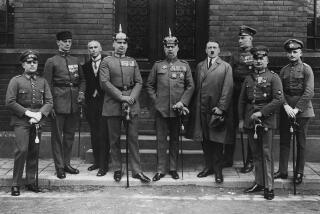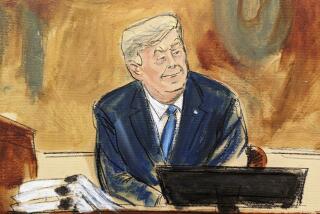Any Method to Ginsburg’s Madness?
- Share via
NEW YORK — Alexis de Tocqueville never met William H. Ginsburg. This is the only way to explain the gap in Tocqueville’s otherwise prophetic remark, “scarcely any political question arises in the United States which is not resolved, sooner or later, into a judicial question.” If Tocqueville had met Ginsburg, he would have added, “except sometimes it’s resolved as farce.”
What is Ginsburg up to? In casual conversations with experienced defense lawyers, none could explain his strategy. Is there a method to Ginsburg’s madness? Or is it just madness? Ginsburg’s boundless pontificating, his shifts in position and his seeming quest for the title “Most Famous American Lawyer du Jour” do nothing to benefit his client, Monica S. Lewinsky, who spends her days in near-isolation on Ginsburg’s instruction. Would that the counselor had heeded his own advice.
It would be presumptuous to tell Ginsburg how to represent Lewinsky--to say what if any deal he should strike with Kenneth W. Starr or to predict the risks if his client goes on trial. We lack information to which Ginsburg is privy, namely, what Lewinsky has told him and her taped conversations with Linda R. Tripp. But Ginsburg’s publicity crusade is alien to how a cautious criminal defense lawyer would behave and risky for Lewinsky.
As every lawyer knows, an attorney is a client’s spokesperson. (The impolite term is mouthpiece.) That means statements a lawyer makes during a representation, even those made out of court, can be attributed to the client and used against her in court. It’s as if the client had made the statement. In an investigation that has had more turns than a corkscrew, Ginsburg cannot know whether the explanation he floats on Lewinsky’s behalf today will help convict her tomorrow. Even statements that seem exculpatory at the time can turn around and bite you.
Imagine, for example, a client is charged with robbing a bank in Los Angeles on March 15. Her lawyer publicly proclaims she was in New York on March 15. It sounds like a total defense. But let’s say the prosecutor is able to prove, beyond doubt, that the client was in Los Angeles that day. The lawyer’s statement now becomes what the law calls a false exculpatory explanation. These can be lethal at trial. The prosecutor’s summation will sound like this: “The defendant’s lawyer said she was in New York. Why? It must be because that’s what the defendant told him. But it was a lie. Why did the defendant lie about her whereabouts unless she had something to hide?”
Or consider what could happen if Lewinsky ever testifies, whether at her own trial or at someone else’s. Because Ginsburg’s statements are attributable to Lewinsky, they can be used to challenge her credibility if she says anything inconsistent.
The garrulous Ginsburg is also flirting with Lewinsky’s attorney-client privilege. The privilege is a legal protection that entitles clients to keep communications with lawyers confidential. The privilege makes it possible for clients to be candid with their lawyers and get the best advice. But the privilege can be waived. A client who reveals some privileged communications in court, for example, will lose protection for the balance of his communications. It’s all or nothing. The waiver may not be total if a lawyer reveals privileged communications outside court. Even if Ginsburg’s public statements risk only partial loss of the privilege, that can spell disaster for Lewinsky.
Sure, none of these dangers may come to pass. But why risk it? When lawyers take chances, it’s because they see a real advantage for clients. Ginsburg’s behavior offers Lewinsky no advantage. An experienced defense lawyer in Ginsburg’s position would say as little as possible. In fact, it should tell Ginsburg something that since he burst onto the Beltway, he has had more “face time” on prime time, more quotes in print, than all other lawyers in the Whitewater and Paula Corbin Jones matters combined. How many Americans can name Vernon Jordan’s lawyer, or Betty Currie’s, or Tripp’s, or even the president’s two lawyers? Ginsburg is getting all the attention not because he has valuable things to say--most of what he says is trite or silly--but because he’s willing to rush in where the other lawyers, quite sensibly, have refused to tread.
Ginsburg’s gallivanting can also deprive Lewinsky of the sympathy that a young woman in her position should easily win. Here she is, caught in a battle between powerful men, betrayed by a close friend. Lewinsky must appear a victim of the machinations of others, not the architect of her own predicament. The last thing Lewinsky needs is for the public to think she shares Ginsburg’s penchant for self-promotion. Yet, the longer she tolerates his conduct--she could order him to stop--the greater the risk that his image will rub off on her.
A final danger Ginsburg--and therefore Lewinsky--faces is judicial displeasure. In Ginsburg’s audience are judges who will rule on his arguments. Judges do not like it when lawyers try their cases in public. Worse, Ginsburg’s thirst for public attention--his need to expound on the most watched shows and in the most widely read publications--casts such serious doubt on his judgment that he risks a kind of spillover judicial skepticism of his legal arguments. One federal judge has already told Ginsburg to cool it, forcing him to postpone an appearance on “Larry King Live.” Ginsburg may have a 1st Amendment right to speak, but he has no 1st Amendment right to promote himself at the expense of his client. In fact, he has a professional obligation not to do so.
In an effort to uncover Ginsburg’s strategy, I have considered the Cockroach Defense. A cockroach moves unpredictably across the floor to confuse its enemies (us) as we try to decide where to stomp our foot. Is Ginsburg’s erratic behavior an effort to confuse prosecutors as they try in vain to guess his secret plan? Well, let them sweat. He has no secret plan. (OK, that’s farfetched. But do you have a better explanation?)
Ginsburg appears to be a decent enough fellow, a favorite-uncle type. In fact, that may be the kind of relationship he once had with Lewinsky. But now she’s his client. That makes a difference. When it comes to nieces, favorite uncles can’t stop gabbing. When it comes to clients, good lawyers never start.
More to Read
Sign up for Essential California
The most important California stories and recommendations in your inbox every morning.
You may occasionally receive promotional content from the Los Angeles Times.













